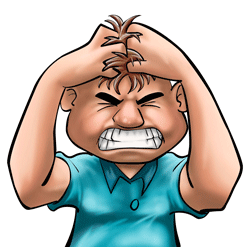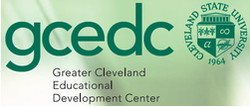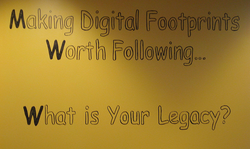
But let us consider a more important outcome of schooling: to create creative, independent, decision makers with the capability of being empathetic people with the goal of bettering their lives and the lives of those around them. While this seems a bit idealistic/liberal/utopian, it is reachable. Think about it...if this is our goal, won’t the other goals (listed above) naturally occur? This isn’t rhetorical; I’m actually interested in your thoughts.
Sidebar done, back to my original thought. In general, I believe that learned helplessness occurs because teachers are not given enough time to truly allow students to work through a problem. The way people in the “real-world” work through problems. Frustration is an integral part of creative thinking and problem solving. As the film discusses, the “Eureka Phenomenon” seems to happen after we walk away from a problem because of our frustration. When I’m frustrated I jump on my motorcycle and ride. I think about the air, the scenario, poetry, anything but the thing that is frustrating me. I let myself get lost. When my mind decides to wander back to reality an answer usually emerges followed quickly with the “why didn’t I think of that?” moment. My point is simple: The structure of education isn’t just effecting our ability to help students become creative, independent thinkers. It is taking away essential emotional growth that is part of how our brains function. It is taking away our ability to feel frustrated, defeated and beaten. Look at sports for a moment. The idea of competition in education is not what I mean; standardized testing already creates a cycle of competition between teachers, schools and states (and it isn’t helping). The example I believe we should take from sports is the idea of what happens after someone looses a game. You go home and forget about it for a bit. Then you watch film, talk to coaches and other players, and use logic to come to a a creative solution to do better next time. That’s what education needs. Teachers need to frustrate their students. They need to allow students to feel failure (not everyone gets a certificate people!!). Confucius (I think) once said, “People only learn from that which they do wrong”. This makes a lot of sense to me, and it is why I am so smart (I have done a lot of wrong in my life!). When we do something right we often simply move on. Even Garth and I spend less time reflecting on things that go well compared to things that don’t go so well. When we make mistakes something inside inspires the majority of us to reflect, analyze and fix those things so that we do better next time.
I ask everyone reading this post to take some time and truly think about the emotional roller coaster the next big problem in your life brings. Think about the frustration, anger, depression, and feelings of inadequacy that are associated with that problem. Then think about the jubilation, happiness, pride that you feel when you do finally solve that problem. As you reflect, think about if those feelings of awesome would have been possible without the feelings of sorrow and frustration. I like films and books, directors and authors that understand human emotion. I have talked about Jack Kerouac before, but this time I want to discuss William Goldman and Rob Reiner. My favorite all time movie, well tied to first at least, is The Princess Bride. Towards the end of the book the hero finds himself frustrated and defeated. Goldman and Reiner illustrate these emotions by having the hero trapped in a torture chamber aptly named “The Pit of Despair”. It is only after dealing with his own feelings of failure and inadequacy that the hero is able to successfully rescue the girl and live happily ever-after. Another great Reiner film, When Harry Met Sally used the same type of situation. The characters have to lament their frustrations and failures before realizes that they could find a solution (happiness) with each other. If our students are never given the opportunity to feel such things then think about how boring the movies they create will be! The ironic part is that I have been concerned about how to stop learned-helplessness for years and it wasn’t until I stopped thinking about it that I found the film below. Now I think I have a solution to the problem and I definitely think that all of my frustration is worth my Eureka moment.
..Look logic backs me up too (err I think)
Modus Ponens
(A) If schools are based on standardized testing, grading periods, and grade levels created based on age then those factors
create learned helpless
(B) Schools are based on standardized testing, grading periods, and grade levels created based on age
(C) Therefore learned helpless is created by schools.
...I’m hoping someone can show me examples of schools that do not group students by age, standardized test scores and grading periods and hopefully demonstrate that learned-helpless is not such a problem; ergo proving my hypothesis.








 RSS Feed
RSS Feed


